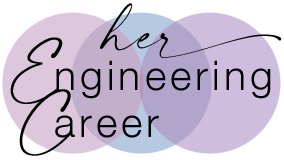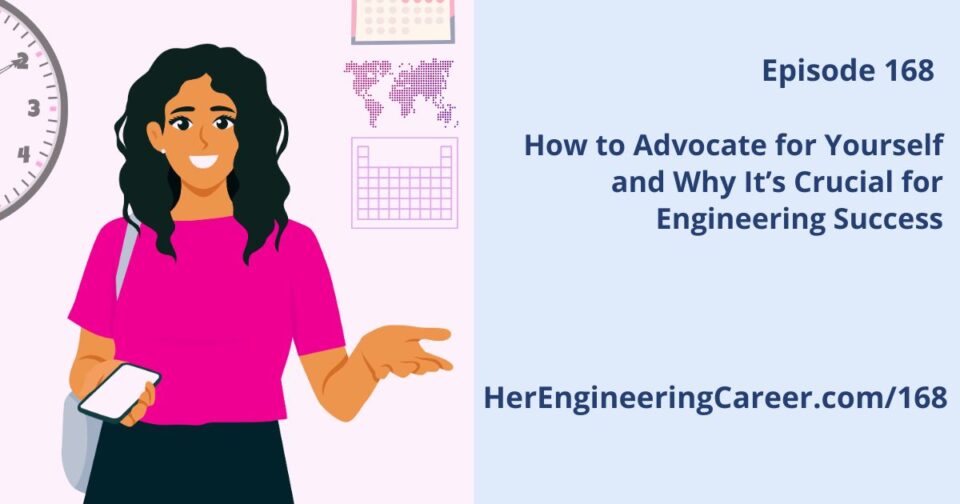Episode Transcript
You’re wishing for more people to know you in your engineering career.
You want people to know who you are.
You want them to see your good work. Your problem-solving skills. Your engineering talent.
So that your impact and your potential stand out.
You want to be noticed and recognized. And given opportunities to grow and excel and move up.
That’s why you’ve been working so hard.
That’s why you go above and beyond.
Perfecting each task. Saying yes. Taking on more workload.
And this all sounds great. Every boss wants this kind of effort from their employees.
But there’s a problem with this approach.
Because, in effect, what you’re wanting is your work to speak for itself.
You’re wanting people to see your good work by noticing you do it.
That would be nice.
But that’s not how it works.
Sorry to say, no one is paying that much attention to you.
Mostly, nobody knows about you and your work unless you tell them.
The Importance of Self-Advocacy in Your Engineering Career
No one has the real story about you and your impact unless they hear it from you.
And if no one knows about you, your work and your impact, then it is nearly impossible to move ahead in your career.
If you’re not telling your career story, others are making one up about you.
And if you’re waiting for others to notice your impact, you’re waiting too long.
This is why you need to advocate for yourself.
Self-advocacy is the most important thing for getting ahead in your career.
When you think about it it’s just common sense.
But it’s amazing to me how long it takes women engineers to figure it out.
Many don’t realize the importance of self-advocacy until mid-career. Some even later than that.
But those who use the power of self-advocacy reach their goals sooner.
They get what they need and want more often.
They move farther and faster along their career paths.
How Reluctance to Advocate for Yourself Denies Your Career Fulfillment
At some point you have to let people know about you:
- Who you are.
- What you’re working on.
- What your impact is.
- What you’re planning to do next.
Maybe you’re like I was in this stage of your engineering career.
And you think advocating for yourself makes you sound arrogant and big-headed.
This is a limiting belief.
Actually, self-advocacy is part of your job.
It’s not only necessary, it’s expected of you as an engineer.
If you’re not advocating for yourself, you’re denying yourself opportunities to reach your goals.
To apply your talents and skills toward making your mark in the world.
Self-Advocacy is a Key Component in the Formula for Career Success
In Episode 144 we talked about the formula for a fulfilling career.
The formula starts with self-advocacy.
Which leads you to more connection. And then to more opportunity.
Which enables you to make your unique contribution. To do work that matters.
This is what brings you career fulfillment.
I’ve recently interviewed a number of women engineers for a book I’m writing.
They’ve all worked their way into high level leadership positions. And every one of them has a self-advocacy story.
Some were good at it from the get-go while others had to learn this skill on the job.
Many didn’t realize how important self-advocacy is until well into their careers.
But all of them agree that it’s critical to career success.
Ways to Advocate for Yourself in Your Engineering Career
Here are 10 situations that require you to advocate for yourself in your engineering career:
- Garnering resources to support your work
- Seeking a raise or a promotion
- Competing for a position or job opportunity
- Proposing your idea for a product, team or customer
- Defending your data or problem-solving procedure
- Communicating your career plans to decision-makers
- Clarifying a misunderstanding or miscommunication
- Speaking up when you’ve been overlooked or ignored
- Influencing others on your point of view
- Explaining your decision and why you made it
Not an exhaustive list, of course.
There are opportunities daily for you to advocate for yourself.
If you’re like most women engineers, self-advocacy doesn’t come naturally.
But it’s a skill that can be learned and developed through practice.
A good way to start is to put together your career message.
Then spread that message to people in your network.
Your career message includes what I mentioned earlier:
- Who you are (your role or title)
- The work you’re doing
- The impact you’re having
- And what you want to do next. [Magic 4]
Sign up for a strategy session with me for more guidance on using self-advocacy to move you forward in your engineering career.
Many of the women I interviewed are also very good at advocating for others.
Advocating for others is important too. But advocating for yourself and advocating for others are 2 different things.
Even if you advocate for others, advocating for yourself is of primary importance.
Because no one else is going to do this for you.
No one else knows you better.
No one else has your best interests in mind.
Self-advocacy is crucial for your engineering career success.
It’s the most important thing.
Next time on Her Engineering Career Podcast we’ll explore career vision and strategy: ways to create these, and the pros and cons of doing so.
Be sure to tune in for Episode 169.

